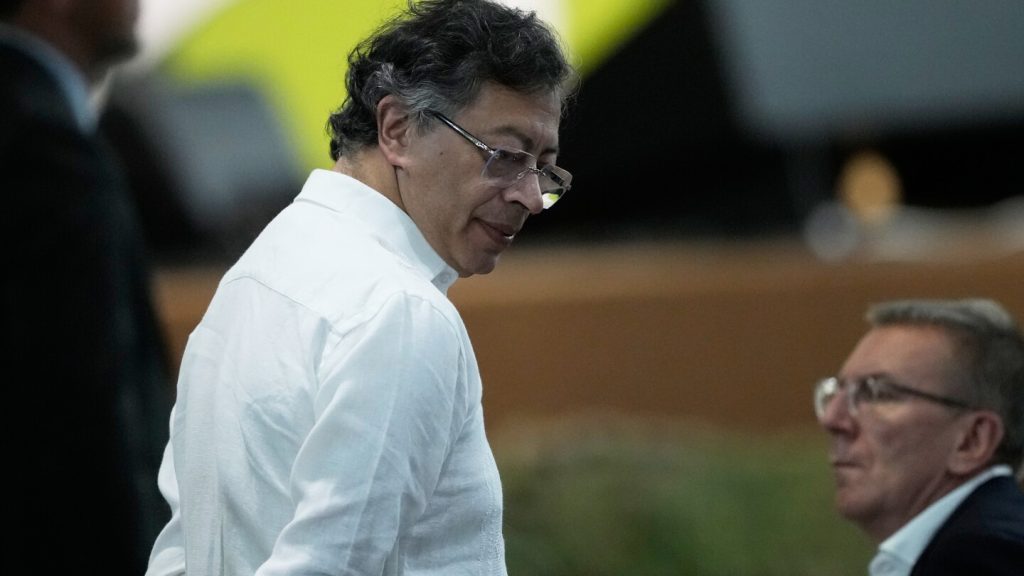Listen to the article
Representatives of European, Latin American, and Caribbean nations gathered in Santa Marta, Colombia on Sunday for a two-day summit aimed at strengthening interregional ties, though the meeting’s relevance has been called into question due to the absence of several key global leaders.
The summit between the Community of Latin American and Caribbean States and the European Union was expected to conclude with a declaration focusing on renewable energy, food security, financing, and technological cooperation, according to Colombian officials.
However, discussions have been overshadowed by growing regional concerns over U.S. military operations targeting alleged drug-carrying vessels in the Caribbean Sea and Eastern Pacific. These operations have resulted in more than 60 deaths since September, with Colombian President Gustavo Petro emerging as one of their strongest critics.
“What are we doing with this meeting in today’s world amidst missiles?” Petro asked attendees in his opening remarks, referencing both the conflict in Gaza and the U.S. strikes. He expressed hope that the summit would serve as “a beacon of light amidst the barbarity.”
Petro has characterized the deaths from these operations as “extrajudicial executions” and has identified at least one of those killed as a Colombian citizen. One of only two known survivors is also Colombian, further intensifying the country’s interest in addressing this issue during the summit.
The relevance of the gathering has been questioned due to notable absences, including European Commission President Ursula von der Leyen and German Chancellor Friedrich Merz. Colombia’s Foreign Ministry has attributed these absences to scheduling conflicts with the concurrent United Nations climate summit but emphasized the presence of Spanish Prime Minister Pedro Sánchez and Brazilian President Luiz Inácio Lula da Silva.
European Council President António Costa struck a conciliatory tone in his address, avoiding direct mention of the controversial vessel operations. “We choose dialogue, not division; we choose cooperation, not confrontation; we choose partnership, not isolation. And in this multipolar world of ours, what is needed is a multilateral response,” Costa stated.
Lula’s unexpected decision to attend the summit rather than Brazil’s hosting of the COP30 climate conference raised eyebrows among international observers. Brazilian Foreign Minister Mauro Vieira explained that Lula’s choice reflected regional solidarity with Venezuela, which faces threats of military action from U.S. President Donald Trump.
“It’s clear that the topic [of U.S. operations] will come up, because the Venezuelan delegation will bring it up,” said Brazilian Ambassador Gisela Padovan, who serves as secretary for Latin American and Caribbean affairs. However, she did not specify whether the issue would be included in the summit’s final statement.
Lula has positioned himself as a mediator in regional tensions, particularly regarding Venezuela. He recently revealed that during a meeting with Trump in Malaysia, he urged the U.S. president to follow former President George W. Bush’s example of engaging in diplomatic efforts following Venezuela’s 2002 coup attempt against then-President Hugo Chávez.
“I told Trump that Latin America is a region of peace,” Lula said.
The Colombia summit has taken on additional significance following the postponement of the Summit of the Americas, making it the last high-level multilateral meeting in the region for 2025. According to Alexander Main, international policy director at the Center for Economic and Policy Research, this timing could facilitate more frank discussions about military deployment concerns, particularly since the United States is not a participant.
“It is clearly a priority for several regional leaders,” Main noted, suggesting that addressing these tensions could be a central outcome of the gathering despite questions about its broader relevance.
Fact Checker
Verify the accuracy of this article using The Disinformation Commission analysis and real-time sources.




8 Comments
While the military operations may have overshadowed the summit, it’s good to see the participating countries still aiming to strengthen interregional ties and cooperation on key issues like renewable energy and food security. These areas will be crucial in the years ahead.
You’re right, those collaborative efforts will be vital, even if the geopolitical tensions are making progress difficult. Hopefully the summit can still yield some meaningful outcomes despite the challenging circumstances.
President Petro’s remarks about the “barbarity” of the military operations highlight the gravity of the situation. It’s unfortunate that these tensions have disrupted what could have been an important regional summit. Hopefully the participating nations can still find ways to collaborate and make progress on shared priorities.
Agreed, the military operations are a major distraction. But the fact that the summit is still proceeding suggests the participating countries recognize the value of strengthening interregional ties, even amidst these challenges.
The summit’s focus on renewable energy, food security, and technological cooperation sounds promising, but the military operations seem to have really overshadowed the proceedings. I’m curious to see if the participating nations can find ways to make tangible progress on those key issues despite the geopolitical turbulence.
It’s concerning to see the rising tensions and loss of life from the U.S. military operations in the region. Hopefully the summit can still provide a forum for constructive dialogue and diplomacy, even if the agenda has been disrupted. Careful management of these complex regional dynamics will be crucial.
Interesting geopolitical dynamics at play here. The absence of key global leaders raises questions about the true scope and impact of this EU-Latin America summit. Curious to see if they can still make meaningful progress on renewable energy, food security, and tech cooperation despite the military tensions overshadowing the event.
Agreed, the military operations in the region are a significant distraction. President Petro’s comments about the “barbarity” of the situation reflect the complexity and challenges facing the participating nations.